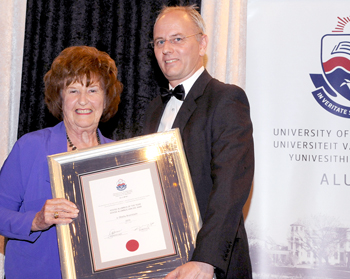
Dr Sheila Aronstam, recipient of the Kovsie of the Year award and Pieter du Toit, Chairperson of the Kovsie Alumni association.
Photo: Dries Myburgh |
The Office for Institutional Advancement at the University of the Free State honoured ten people at this year’s Kovsie Alumni dinner.
Dr Sheila Aronstam received the Kovsie Alumnus of the Year award. Dr Aronstam previously served for eight years on the management of the UFS, where she played a prominent part in the transformation of the UFS. In 2004, with the centenary celebrations of the University of the Free State, Dr Aronstam received a centenary medal for her contribution towards transformation.
She also served on the Council and the Executive of the University of the Free State for period of five years.
In 2014, after a lifelong commitment to Bloemfontein and the University of the Free State, Kovsie Alumni honoured Dr Aronstam as Alumnus of the Year. “Her legacy of equality, tolerance and charity will live forever within the borders of the University of the Free State and the City of Bloemfontein,” said Pieter du Toit, Chairperson of the Kovsie Alumni association.
At this event, Cum Laude awards were bestowed on:
- Chris Botha, Group Managing Director of Media Shop
- Pauline Gutter, Free State-based artist
- Tate Makgoe, MEC for Education in the Free State
- Jans Rautenbach, South African screenwriter, film producer and director
- Johan Volsteedt, former principal of Grey College and involved with the television series Dream School SA.
The Ambassador Award was presented to:
- Odeion String Quartet at the UFS
- Sibusiso Tshabalala, programme coordinator of the World Design Capital promotion project.
Executive Management Awards were bestowed on:
- Prof Johan Nel (Emeritus Assosiate Professor UFS )
- DB Prinsloo, Director of KovsieSport at the UFS.
Kovsie Alumni also bestowed honorary president awards on Prof Nico du Plessis and Adv Mauritz Randlehoff.